An expanded and reedited version of a 2012 THC post
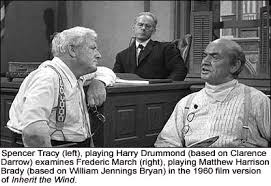 I
still recall the family getting in the car for the drive to
Hartford, Connecticut. It was the late 1950s, and my father was taking
us to pick up a monkey. He had a small role as an Italian
organ-grinder in a play put on by a local community theater group. The
director wanted to use a prop monkey, but dad insisted on the real
thing. We housed that monkey for the next week; I remember it as nasty
and mean-tempered, but the audience loved it and my father in his bit
part (he always had a knack for showmanship). The play was Inherit The Wind.
Last week was the 90th anniversary of the start of the trial (July 10,
1925) on which the play was based, an event that became popularly known
as the Scopes Monkey Trial.
I
still recall the family getting in the car for the drive to
Hartford, Connecticut. It was the late 1950s, and my father was taking
us to pick up a monkey. He had a small role as an Italian
organ-grinder in a play put on by a local community theater group. The
director wanted to use a prop monkey, but dad insisted on the real
thing. We housed that monkey for the next week; I remember it as nasty
and mean-tempered, but the audience loved it and my father in his bit
part (he always had a knack for showmanship). The play was Inherit The Wind.
Last week was the 90th anniversary of the start of the trial (July 10,
1925) on which the play was based, an event that became popularly known
as the Scopes Monkey Trial.
Seeing the play and, later, the movie, I accepted its narrative of the forces of enlightenment, reason, heroism, and tolerance (represented by Spencer Tracey in the movie, playing a character based on Clarence Darrow) against the forces of narrow-mindedness, mean-spiritedness, repression, and unthinking old-fashioned religion (represented by Frederic March playing a character based on William Jennings Bryan); a morality play of liberal versus conservative. The play is still staged frequently by regional theaters (here’s a recent Wisconsin production), has gone through several Broadway revivals, most recently in 2007, with Christopher Plummer and Brian Dennehy. There was even a London production, in 2009, with Kevin Spacey. In most cases, it is widely accepted by audiences as historically accurate.
It was only years later, prompted by reading Edward Larson’s Summer For The Gods and doing related research that I appreciated how much more complex and interesting the real story was. American history is much more fascinating and instructive when you don’t try to neatly shoehorn it into boxes labeled “liberal,” “conservative,” “progressive,” and “reactionary” as Inherit The Wind did, aided by influential mid-2oth century historians and literary critics such as Richard Hofstadter. Throughout our history, you’ll see prominent people with a constellation of political views that are unrecognizable in today’s categories. I'm in favor of the teaching of evolutionary theory but the full story behind the Scopes Trial is more interesting than the caricature of Inherit The Wind and, as I learned, the main character in this drama, William Jennings Bryan, would not neatly fit into any political classification in modern-day America.
The Background
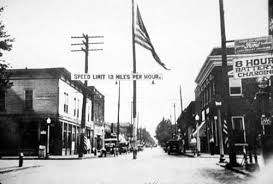
The early 20th century saw an explosion in the growth of public high
schools. In 1890, there were fewer than 200,000 public high-school
students nationwide; by 1920, there were more than two million. In
Tennessee, where the trial took place there were fewer than 10,000 in
1910, but more than 50,000 by 1920. What were they to be taught?
At the same time, battles were heating up between Darwinists and some religious denominations over the teaching of evolution. State legislative fights over its inclusion in educational curriculum became common.
Legislative efforts barring the teaching of evolutionary theory were successful in a small number of states, including Tennessee, which passed its law in early 1925. It was part of a larger package of laws in a massive education reform bill that laid the foundation for state-supported public schools. It was signed into law by progressive Governor Peay. Violation of the ban on teaching evolution carried a $100 fine, but no jail. Bryan supported the bill, but unsuccessfully lobbied against having any fine attached to violating the evolution provision, though no one at the time expected any prosecutions under the statute.
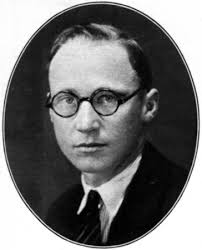
Looking for a test case, the American Civil Liberties Union placed
advertisements in Tennessee papers offering to defend anyone prosecuted
under the Act. Leading citizens of the town of Dayton decided to take
them up on it. While some were interested in challenging the law, many
others just saw it as a good opportunity to create publicity and
generate business for the town. Rather than showcasing a contentious,
divided populace, as portrayed in the play, the actual trial took place
in a festive atmosphere, according to reporters like H.L. Mencken. The
key players in Dayton recruited John Scopes, a young, part-time
schoolteacher, to be the defendant and agreed to pay any penalty imposed
on him.
Dayton was a small town in East Tennessee, and part of the only Republican enclave in the state. Bryan won every southern state in each of his three presidential runs, but never carried Rhea County where Dayton was located. The town was also heavily Methodist in a state dominated by Baptists (the Baptist Convention, meeting in Memphis just before the trial, refused to add an anti-evolution plank to the denomination’s statement of faith).
Once the ACLU came into the case, Bryan — the country’s leading opponent of the teaching of evolution — agreed to become part of the prosecution’s team. And through some very complicated machinations, Clarence Darrow, the most famous criminal defense lawyer in America, joined the defense team. When this happened, the trial became the biggest story in the country, and was also followed heavily in Europe. A deluge of reporters descended on Dayton.
Why Evolution? Why Bryan?
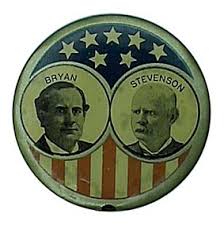 In
1925, 65-year-old William Jennings Bryan was well known to every
American, having run unsuccessfully three times as the Democratic
Party’s presidential candidate (1896, 1900, and 1908). A remarkable
orator — his “Cross of Gold” speech at the 1896 convention
secured him the nomination — he is considered to have been the first
populist to run for President. In 1913, Woodrow Wilson appointed him
Secretary of State, a post he resigned in 1915 when the pacifist Bryan
became convinced Wilson was maneuvering the country into entering the
First World War.
In
1925, 65-year-old William Jennings Bryan was well known to every
American, having run unsuccessfully three times as the Democratic
Party’s presidential candidate (1896, 1900, and 1908). A remarkable
orator — his “Cross of Gold” speech at the 1896 convention
secured him the nomination — he is considered to have been the first
populist to run for President. In 1913, Woodrow Wilson appointed him
Secretary of State, a post he resigned in 1915 when the pacifist Bryan
became convinced Wilson was maneuvering the country into entering the
First World War.
Bryan campaigned successfully in support of four constitutional amendments: direct election of senators, the Federal income tax, women’s suffrage, and Prohibition. He certainly doesn’t sound like a man who fits the image created by Inherit The Wind. So why, in the 1920s, did he undertake leadership of the crusade against the teaching of Darwinism, and why did he think it was consistent with his other views?
The first, and probably subsidiary reason, was Bryan’s belief in “popular sovereignty.” Bryan had always campaigned against big business and the banks and on behalf of the common people. When the Supreme Court overturned some of the early progressive labor laws, Bryan supported (unsuccessful) legislation to limit judicial review, and backed the Progressive use of popular referendums. He believed the people were entitled to what they wanted, and he saw the evolution issue in the same way. According to Bryan:
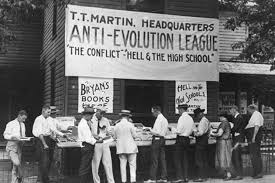 The
deeper reason was Bryan’s concerns about the implications of Darwinism.
Bryan was a committed Christian, pacifist, and believer in the dignity
of every human being. He rejected evolutionary theory as a matter of
religious faith, but also believed Darwinism and its doctrine of
“survival of the fittest” threatened the dignity and perhaps even the
very existence of the weakest of the human flock. Bryan saw a direct
connection between the excesses of capitalism and militarism — which he
had denounced throughout his career — and Darwinism, which, as early as
1904, he had called “the merciless law by which the strong crowd out and
kill off the weak.”
The
deeper reason was Bryan’s concerns about the implications of Darwinism.
Bryan was a committed Christian, pacifist, and believer in the dignity
of every human being. He rejected evolutionary theory as a matter of
religious faith, but also believed Darwinism and its doctrine of
“survival of the fittest” threatened the dignity and perhaps even the
very existence of the weakest of the human flock. Bryan saw a direct
connection between the excesses of capitalism and militarism — which he
had denounced throughout his career — and Darwinism, which, as early as
1904, he had called “the merciless law by which the strong crowd out and
kill off the weak.”
The concerns Bryan raised in 1904 were reinforced by recent events. The slaughter of WWI appalled Bryan. He saw German militarism as Darwinian selection in action; this was a common view at the time, as reflected in the words of Vernon Kellogg in his book Headquarters Nights: “Natural selection based on violent and fatal competitive struggle is the gospel of the German intellectuals.”
Bryan saw the modernist wing of the Progressives, led by Woodrow Wilson, as willing to go down this same road. It is striking to see how much Darwinism was in the air of politics at the time.
Wilson’s key 1912 campaign speech, “What is Progress?” espoused a Darwinian approach to American government:
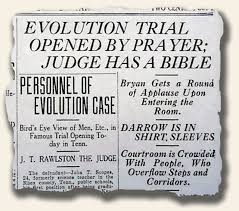 The new science of eugenics troubled Bryan, as did WWI. The high school textbook used by John Scopes was A Civic Biology
by George William Hunter, in which he defined eugenics as “the science
of improving the human race by better heredity.” Hunter wrote,
The new science of eugenics troubled Bryan, as did WWI. The high school textbook used by John Scopes was A Civic Biology
by George William Hunter, in which he defined eugenics as “the science
of improving the human race by better heredity.” Hunter wrote,
Eugenics had many scientist adherents in the United States and England who believed that the human race could be made better via selective breeding to create a better and more progressive world. One of those scientists, A.E. Wiggam, expressed the connection between the teaching of evolution and eugenics:
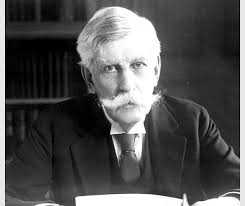
During the 1920s and 30s, the eugenics movement gained momentum. By
1935, more than 30 states had laws mandating sexual segregation and
sterilization of persons regarded as eugenically unfit. The most
notorious expression of support for eugenics came in 1927 from the
leading Social Darwinist on the Supreme Court, Oliver Wendell Holmes,
Jr., who in his opinion for the Court upholding Oklahoma’s sterilization
law wrote, “three generations of imbeciles is enough.” The only
dissenting vote was cast by Pierce Butler, the lone Catholic on the
Court.
Within a few years, WWII and the revulsion against Nazi law and experimentation would put an end to the eugenics movement (though a revival of eugenics under another name is conceivable with modern advances in biology and genetics). The heyday of both the eugenics movement and the rise of anti-evolutionary forces led to the Dayton trial in 1925. Bryan expressed his pithy view of the whole matter when commenting on the latest discovery of purported early human remains: “Men who would not cross the street to save a soul have traveled across the world in search of skeletons.” In his closing argument at trial, Bryan put it this way regarding evolutionary theory:
Rather than the often repeated adage that the victors write the history of an event, the story of anything is actually determined by the unswerving adoption of one version of it, and the telling of that version by a determined cadre of writers. In time, the version with the most persistent adherents becomes the “truth.” – David & Jeanne Heidler in Henry Clay: The Essential American (2010)
Seeing the play and, later, the movie, I accepted its narrative of the forces of enlightenment, reason, heroism, and tolerance (represented by Spencer Tracey in the movie, playing a character based on Clarence Darrow) against the forces of narrow-mindedness, mean-spiritedness, repression, and unthinking old-fashioned religion (represented by Frederic March playing a character based on William Jennings Bryan); a morality play of liberal versus conservative. The play is still staged frequently by regional theaters (here’s a recent Wisconsin production), has gone through several Broadway revivals, most recently in 2007, with Christopher Plummer and Brian Dennehy. There was even a London production, in 2009, with Kevin Spacey. In most cases, it is widely accepted by audiences as historically accurate.
It was only years later, prompted by reading Edward Larson’s Summer For The Gods and doing related research that I appreciated how much more complex and interesting the real story was. American history is much more fascinating and instructive when you don’t try to neatly shoehorn it into boxes labeled “liberal,” “conservative,” “progressive,” and “reactionary” as Inherit The Wind did, aided by influential mid-2oth century historians and literary critics such as Richard Hofstadter. Throughout our history, you’ll see prominent people with a constellation of political views that are unrecognizable in today’s categories. I'm in favor of the teaching of evolutionary theory but the full story behind the Scopes Trial is more interesting than the caricature of Inherit The Wind and, as I learned, the main character in this drama, William Jennings Bryan, would not neatly fit into any political classification in modern-day America.
The Background
Dayton in 1925
At the same time, battles were heating up between Darwinists and some religious denominations over the teaching of evolution. State legislative fights over its inclusion in educational curriculum became common.
Legislative efforts barring the teaching of evolutionary theory were successful in a small number of states, including Tennessee, which passed its law in early 1925. It was part of a larger package of laws in a massive education reform bill that laid the foundation for state-supported public schools. It was signed into law by progressive Governor Peay. Violation of the ban on teaching evolution carried a $100 fine, but no jail. Bryan supported the bill, but unsuccessfully lobbied against having any fine attached to violating the evolution provision, though no one at the time expected any prosecutions under the statute.
John Scopes
Dayton was a small town in East Tennessee, and part of the only Republican enclave in the state. Bryan won every southern state in each of his three presidential runs, but never carried Rhea County where Dayton was located. The town was also heavily Methodist in a state dominated by Baptists (the Baptist Convention, meeting in Memphis just before the trial, refused to add an anti-evolution plank to the denomination’s statement of faith).
Once the ACLU came into the case, Bryan — the country’s leading opponent of the teaching of evolution — agreed to become part of the prosecution’s team. And through some very complicated machinations, Clarence Darrow, the most famous criminal defense lawyer in America, joined the defense team. When this happened, the trial became the biggest story in the country, and was also followed heavily in Europe. A deluge of reporters descended on Dayton.
Why Evolution? Why Bryan?
Bryan campaigned successfully in support of four constitutional amendments: direct election of senators, the Federal income tax, women’s suffrage, and Prohibition. He certainly doesn’t sound like a man who fits the image created by Inherit The Wind. So why, in the 1920s, did he undertake leadership of the crusade against the teaching of Darwinism, and why did he think it was consistent with his other views?
The first, and probably subsidiary reason, was Bryan’s belief in “popular sovereignty.” Bryan had always campaigned against big business and the banks and on behalf of the common people. When the Supreme Court overturned some of the early progressive labor laws, Bryan supported (unsuccessful) legislation to limit judicial review, and backed the Progressive use of popular referendums. He believed the people were entitled to what they wanted, and he saw the evolution issue in the same way. According to Bryan:
It is no infringement on their freedom of conscience or freedom of speech to say that, while as individuals they are at liberty to think as they please and say what they like, they have no right to demand pay for teaching that which parents and the taxpayer do not want taught.
The concerns Bryan raised in 1904 were reinforced by recent events. The slaughter of WWI appalled Bryan. He saw German militarism as Darwinian selection in action; this was a common view at the time, as reflected in the words of Vernon Kellogg in his book Headquarters Nights: “Natural selection based on violent and fatal competitive struggle is the gospel of the German intellectuals.”
Bryan saw the modernist wing of the Progressives, led by Woodrow Wilson, as willing to go down this same road. It is striking to see how much Darwinism was in the air of politics at the time.
Wilson’s key 1912 campaign speech, “What is Progress?” espoused a Darwinian approach to American government:
Now, it came to me, as this interesting man talked, that the Constitution of the United States had been made under the dominion of the Newtonian Theory. You have only to read the papers of the The Federalist to see that fact written on every page. They speak of the “checks and balances” of the Constitution, and use to express their idea the simile of the organization of the universe, and particularly of the solar system — how by the attraction of gravitation the various parts are held in their orbits; and then they proceed to represent Congress, the Judiciary, and the President as a sort of imitation of the solar system. …
Living political constitutions must be Darwinian in structure and in practice. Society is a living organism and must obey the laws of life, not of mechanics; it must develop. All that progressives ask or desire is permission — in an era when “development” “evolution,” is the scientific word — to interpret the Constitution according to the Darwinian principle; all they ask is recognition of the fact that a nation is a living thing and not a machine. [emphasis added]
If such people were lower animals, we would probably kill them off to prevent them from spreading … Humanity will not allow this, but we do have the remedy of separating the sexes in asylums or other places and in various ways preventing intermarriage and the possibility of perpetuating such a low and degenerate race.The prior edition of Hunter’s textbook had contained language specifically citing biological deficiencies of African races.
Eugenics had many scientist adherents in the United States and England who believed that the human race could be made better via selective breeding to create a better and more progressive world. One of those scientists, A.E. Wiggam, expressed the connection between the teaching of evolution and eugenics:
“until we can convince the common man of the fact of evolution … I fear we cannot convince him of the profound ethical and religious significance of the thing we call eugenics.”
Holmes
Within a few years, WWII and the revulsion against Nazi law and experimentation would put an end to the eugenics movement (though a revival of eugenics under another name is conceivable with modern advances in biology and genetics). The heyday of both the eugenics movement and the rise of anti-evolutionary forces led to the Dayton trial in 1925. Bryan expressed his pithy view of the whole matter when commenting on the latest discovery of purported early human remains: “Men who would not cross the street to save a soul have traveled across the world in search of skeletons.” In his closing argument at trial, Bryan put it this way regarding evolutionary theory:
". . . if taken seriously and made the basis of a philosophy of life, it would eliminate love and carry man back to a struggle of tooth and claw."
The Trial and its Aftermath
of maneuvers — Darrow seized control of the defense strategy and was cleverly able to lure Bryan to the stand, where he cross-examined him viciously on Biblical inconsistencies. (Darrow might have been a terrible person, but you’d want him defending you if you were on trial). This prompted a Congregational Church official who supported the legal challenge to send a note to the ACLU:
“May I express the earnest opinion that not five percent of the ministers in this liberal denomination have any sympathy with Mr Darrow’s conduct of the case.”Edwin Mims of Vanderbilt University, another supporter of the ACLU, wrote:
“When Clarence Darrow is put forth as the champion of the forces of enlightenment to fight the battle for scientific knowledge, one feels almost persuaded to become a Fundamentalist.”The jury quickly returned a verdict finding Scopes guilty. Bryan offered to pay the $100 fine, and the local school board offered to renew his contract for another year, but Scopes decided to go to graduate school, attending the University of Chicago and becoming a petroleum engineer.
Five days after the end of the trial, William Jennings Bryan passed away while taking his afternoon nap.
No comments:
Post a Comment